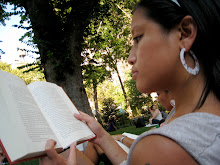
In 1990, nearly 99% of the world's population is wiped out by the accidental release of a U.S. govt-created plague. Called Captain Trips by many, and Superflu by others, millions of people die horribly, in a state of delirium and fear, choking on their own mucus. However, about 1% of the population is not affected. These people are left to rebuild the shattered remains of their world. Half are compelled to follow their very vivid dreams to Boulder, and the other half...their nightmares to the dark man in Vegas.
The Stand rates as one of my top 5 favorite books of all time. To me, this novel is Stephen King's most courageous dive into the study of sociology and parapyschology. I am most fascinated by how vividly he outlined the post-apocalyptic world. I mean, think about it, money no longer matters...education, status, fashion. All of what we hold so dear to us now, is basically moot. Everyone gets the opportunity to start fresh. Of course, humans being humans...many will make the same mistakes, even after being forced to learn such a catastrophic lesson.
What also intrigued me was how quickly the Dark Man's society was set up again. They had water, electricity running, even the beginnings of a school system. As Glen Bateman so adequately put it, many techies would be drawn to the dark man's side...they crave order and structure, perhaps even at the cost of their freedom and peace of mind.
However, on Mother Abagail's side, while people felt (relatively) safe, organizationally, there was almost total chaos. Even with the institution of the governing board (or perhaps because of?) it took much longer for this group to get rolling. As Bateman said again, Mother Abagail's side consisted mostly of professors, writers, free-thinkers. In truth, these kinds of people are most useless in the direct aftermath of an apocalypse.
These are just a few of the points I found most fascinating with this novel. The parapyschology aspect I enjoyed, but it's the sociological implications that I found to be much more unsettling. And to me, a great novel is one that is completely disarming.





No comments:
Post a Comment